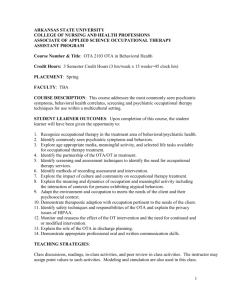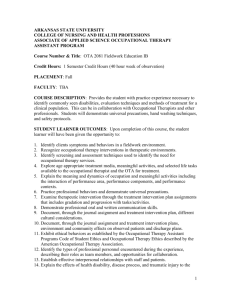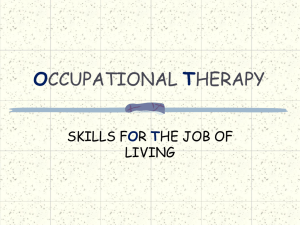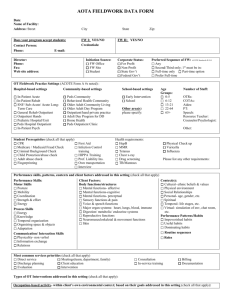OTA 205 Medical Conditions in Occupational Therapy
advertisement
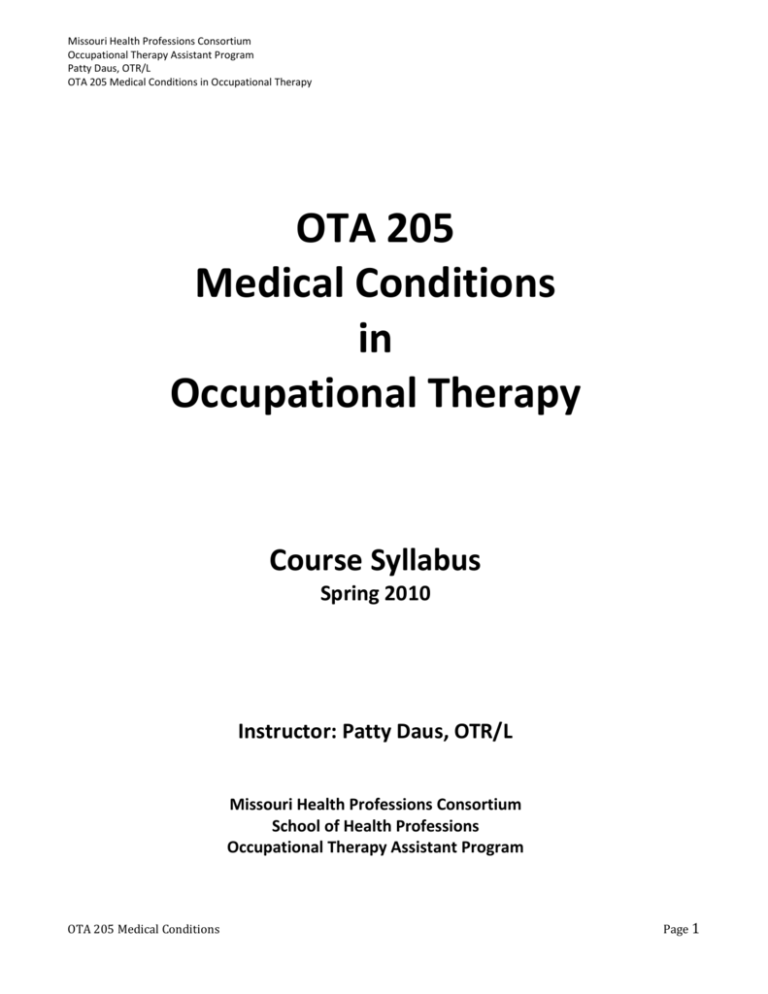
Missouri Health Professions Consortium Occupational Therapy Assistant Program Patty Daus, OTR/L OTA 205 Medical Conditions in Occupational Therapy OTA 205 Medical Conditions in Occupational Therapy Course Syllabus Spring 2010 Instructor: Patty Daus, OTR/L Missouri Health Professions Consortium School of Health Professions Occupational Therapy Assistant Program OTA 205 Medical Conditions Page 1 Missouri Health Professions Consortium School of Health Professions Occupational Therapy Assistant Program OTA 205 Medical Conditions in Occupational Therapy OTA 205 Medical Conditions in Occupational Therapy 3 credits, 3 lecture Class times: Tues and Thurs 2:30 - 4 Instructor: Patty Daus, OTR/L, Clinical Instructor UM Office # 573-884-6902 Office Hours at SFCC, MPC 220: Wednesday 12-1 and 4-5 Office Hours at UM, 203 Clark Hall: by appointment Email or call UM Office: 573-884-5689 to schedule an appointment E-mail: dausp@health.missouri.edu Catalogue Description: OTA 205 Medical Conditions in Occupational Therapy This course presents the etiology and symptoms of medical and psychological clinical conditions across the lifespan that are commonly referred to occupational therapy services. Course content emphasizes the effects of trauma, disease, and congenital conditions on the biological, psychological, and social domains of occupational behavior. An exploration of cultural perspectives on disease and wellness will be included. Course Objective within the Curriculum: This course offers exposure to medical and psychological clinical conditions across culture and lifespan, and how occupational therapy intervention can assist the individual and their family. Relationship to Curriculum Philosophy and Design: This course will educate OTA students on medical conditions that may limit health and wellness and which are often referred to occupational therapy services. The students will learn how those conditions can limit functional abilities, and therefore impact occupational performance throughout the life span. The students will learn through class readings, case studies, research and class participation the etiology of the condition, the affected body systems, and typical age groups affected. There will be emphasis placed on lifelong learning. Students will gain an understanding that treatments for conditions have changed over the years, and how staying current will allow them to be the best resource for their patients. Cultural perspectives on disease and wellness will be addressed along with the ethics of the profession, so students will develop a framework in which to work with those with differing beliefs. This course is designed to collaborate with and compliment information presented in Physical Disabilities, Pediatrics, Mental Health and Psychosocial Practice, and to provide a throughout provocative basis for Professional Skills as well as Ethics, Management, and Leadership. This fits the integrative, holistic design of the program curriculum and is considered essential as a basis to establish and understand the effects of disease on occupational performance and community health outcomes. OTA 205 Medical Conditions Page 2 Missouri Health Professions Consortium School of Health Professions Occupational Therapy Assistant Program OTA 205 Medical Conditions in Occupational Therapy Instructional Method Lecture Guest speakers and or video of individuals who have a variety of disabilities and how the disability impacts their occupational performance In class learning experiences Research on line and community resources Assessment Methods Attendance and participation Midterm Exam (cumulative) Final Exam (cumulative) Completion of chapter assignments Completion of chapter quizzes (timed) Grading rubric for final project Prerequisites: Admission to the MHPC OTA Program through MACC. Co-requisite: OTA 200 Foundations of Occupational Therapy, OTA 210 Analysis of Occupations, OTA 215 Mental Health and Psychosocial Practice, and OTA 220 Pediatric and Adolescent Practice. Required Texts: Atchison, B., Dirette, D. 3rd edition (2007). Conditions in Occupational Therapy, Lippincott Williams & Wilkins. ISBN-13: 978-0-7817-5487-3 ISBN-10: 0-7817-5487-9 th Ryan E. S., Sladyk K., 4 edition (2005). Ryan’s Occupational Therapy Assistant: Principles, Practice Issues, and Techniques, Slack Incorporated ISBN-13:978-1-55642-740-4 ISBN-10: 1-55642-740-9 HOMEWORK/ASSIGNMENTS: Students are expected to turn in assignments on or before the due date given on the syllabus. 25% will automatically be deducted from the grade if the student is late turning in an assignment. Assignments will not be accepted 48 hours after the due date/time. POINTS: (see individual rubrics for assignment descriptions) Timed Chapter quizzes (10 points each x 5 =50 points) Points 50 Providing Chapter quiz questions (2 points each x 5 = 10 points total) 10 Chapter assignments 1 point 10 Final Project 30 Mid term 50 Final 50 TOTAL POSSIBLE Grade A B C D 200 POINTS 180-200 160-179 140-159 120-139 OTA 205 Medical Conditions Page 3 Missouri Health Professions Consortium School of Health Professions Occupational Therapy Assistant Program OTA 205 Medical Conditions in Occupational Therapy F Under 120 ATTENDANCE POLICY All absences must be reported to the MHPC (573- 884-5689) prior to the start of class. Students enrolled in the MHPC OTA program are expected to attend all scheduled class sessions. Students are expected to be prepared, and demonstrate timely attendance for all class/lab/fieldwork sessions and appointments. Attendance will be taken at the discretion of the instructors. A faculty member may use attendance, or lack of attendance, as a criterion in the determination of a course grade. In the event of an unexpected absence, it is the student's responsibility to notify the OTA Program Office and send an e-mail to the course instructor(s) regarding missed work and reason for absence. The instructor on record can then make a determination with this information on how the absences can be rectified or whether it is possible to satisfactorily complete the course with the number of identified absences. Students aware of an anticipated absence should inform the course instructor at least 24 hours in advance, in writing; email is acceptable. For students exhibiting habitual tardiness or absence (i.e. more than one occurrence) the course instructor will note the issue on the student’s academic advising form and put a copy in the student’s file. If two consecutive weeks of class are missed during the regular 16-week semester, the student will be dropped from that class unless acceptable justification is supplied to the instructor, Program Director, and Dean of the community college. Additionally, a student who misses more than one-fourth of the class during any scheduled session may be dropped from that class by the instructor if in the opinion of the instructor the student does not have a reasonable opportunity to succeed in the class. STUDENT EXPECTATIONS Attendance in class is expected, as well as arriving promptly to a scheduled volunteer interview. You are to be prepared, and demonstrate timely attendance for all class/lab/fieldwork sessions and appointments. You are encouraged to ask questions, make relevant contributions, and clarify issues as needed. It is the student’s responsibility to ensure acquisition of all materials and content of any missed classes. Assignments are expected to be turned in on time, and points will be reduced for any late coursework not previously approved by the instructor. Professional behavior is essential and expected at all times. ACADEMIC POLICY The Missouri Health Professions Consortium (MHPC) considers academic dishonesty a serious offense. Students are expected to be familiar with their home campus’ definitions and explanations of academic dishonestly. MHPC will uphold and refer to those definitions. The department will not tolerate plagiarism, cheating, unauthorized possession of exams or exam questions/information, tampering with instructor's grade book or grades, or in any way producing class work, papers, or exams through deceptive, illegitimate means. Any student who commits an act of academic dishonesty is subject to disciplinary action and possible dismissal from the program. Academic honesty is fundamental to the activities and principles of a program. All members of the academic community must honorably have acquired, developed, and presented. Any effort to gain an advantage not given to all students is dishonest whether or not the effort is successful. The academic community regards academic dishonesty as an extremely serious matter, with serious consequences that OTA 205 Medical Conditions Page 4 Missouri Health Professions Consortium School of Health Professions Occupational Therapy Assistant Program OTA 205 Medical Conditions in Occupational Therapy range from probation to expulsion. When in doubt about plagiarism, paraphrasing, quoting, or collaboration, consult the course instructor. MHPC Statement) - AMERICANS WITH DISABILITIES ACT Students who have disabilities that qualify under the Americans with Disabilities Act (ADA) should register with their home campus if requesting accommodations and/or assistance. All members of the Missouri Health Professions Consortium comply with ADA guidelines. If you have special needs as addressed by the Americans with Disabilities Act (ADA) and need assistance, please notify the course instructor immediately and/or contact the Access/ADA Office at your college to confidentially discuss disability information, academic accommodations, appropriate documentation and procedures. Students may register for assistance through the Office of Access and ADA Services through their respective home campuses. Respective ADA college contact information is listed below: MACC: The Office of Access and ADA Services is located in the Main Library and the phone number is (660) 263-4110 ext. 11240. Students may also contact the Columbia office at (573) 234-1067 ext. 12120. If you need accommodations because of a disability, if you have emergency medical information to share with me, or if you need special arrangements in case the building must be evacuated, please inform me immediately. Please see me privately after class, or at my office. Office location & Office hours are printed on the syllabus. Course Objectives: Upon completion of this course, the student will be able to: 1. The student will synthesize information about commonly seen medical conditions in the practice of occupational therapy. This information will then be applied to an occupational performance perspective: “how might this condition impinge upon the occupational performance components and the occupational performance areas?” 2. Describe the most frequently occurring medical conditions that cause difficulty with daily living skills 3. Understand the etiology, prognosis, and progression of the conditions 4. Understand the routine diagnostic tests for specific conditions 5. Understand the medical management of conditions 6. Demonstrate ability to determine which OT services a client may need 7. Reflect on the ramifications of a specific condition to a specific client OTA 205 Medical Conditions Page 5 Missouri Health Professions Consortium School of Health Professions Occupational Therapy Assistant Program OTA 205 Medical Conditions in Occupational Therapy Schedule Date Topic Reading Assignment Assigned Blackboard Homework (Due 1 week, after assigned) Tue, 1- 5 Week 1 Th, 1-7 Tue, 1-12 Week 2 Review Syllabus Thinking like an OT Atchison, Ch 1 1) Answer chapter questions from assigned reading Dementia Alzheimer Atchison, Ch 8 Ryan, Ch 29 1) Answer chapter questions from assigned reading 2) Write 1 multiple choice and 1 essay question chapter questions on discussion board. Provide answer and support information. If someone has already posted your questions, you must post a different question. Cerebrovascular Accident (CVA) Atchison, Ch 9 Ryan, Ch 26 1) Answer chapter questions from assigned reading Orthopedics Atchison, Ch 17 Ryan, Ch 24 1)Answer chapter questions from assigned reading 2) Write 1 multiple choice and 1 essay question chapter questions on discussion board. Provide answer and support information. If someone has already posted your questions, you must post a different question. Spinal Cord Injury Atchison, Ch 16 Ryan, Ch 19 1) Answer chapter questions from assigned reading Traumatic Brain Injury (TBI) Atchison, Ch 12 Ryan, Ch 18 1) Answer chapter questions from assigned reading 2) Write 1 multiple choice and 1 essay question chapter questions on discussion board. Provide answer and support information. If someone has already posted your questions, you must post a different question. Rheumatoid Arthritis (RA) Atchison, Ch 15 Ryan, Ch 23 1)Answer chapter questions from assigned reading Th, 1- 14 Tue, 1- 19 Week 3 Th, 1- 21 Tue, 1- 26 Week 4 Th, 1- 28 Tue, 2-2 Week 5 Th, 2- 4 Tue, 2-9 Week 6 Th, 2- 11 Tue, 2-16 Week 7 Th, 2- 18 OTA 205 Medical Conditions Page 6 Missouri Health Professions Consortium School of Health Professions Occupational Therapy Assistant Program OTA 205 Medical Conditions in Occupational Therapy Tue, 2-23 Week 8 Cardiopulmonary Diabetes (DM) Atchison, Ch 10 Atchison, Ch 11 Read Blackboard article on amputation 1)Answer chapter questions from assigned reading Th, 2- 25 MID TERM Tue, 3-2 BREAK Week 9 Th, 3- 4 BREAK Tue, 3-9 Week 10 Progressive Neurological Disorders Atchison, Ch 14 Ryan, Ch 21 & 27 Blackboard Meg Morris article 1)Answer chapter questions from assigned reading 2) Write 1 multiple choice and 1 essay question chapter questions on discussion board. Provide answer and support information. If someone has already posted your questions, you must post a different question. Burns Atchison, Ch 13 1) Answer chapter questions from assigned reading Substance Abuse Schizophrenia Ryan, Ch 25 Atchison, Ch 5 & Ryan 20 Mental Health Book pg 619622 1) Answer chapter questions from assigned reading 2) Write 1 multiple choice and 1 essay question chapter questions on discussion board. Provide answer and support information. If someone has already posted your questions, you must post a different question. Th, 3- 25 Tue, 3-30 Week 13 Mood Disorders Anxiety Disorders Atchison, Ch 6 & Ryan, Ch 17 Atchison, Ch 7 & Ryan, Ch 22 1) Answer chapter questions from assigned reading Th, 4- 1 Tue, 4-6 Week 14 Cerebral Palsy (CP) Autism Atchison, Ch 2 Atchison, Ch 3 1) Answer chapter questions from assigned reading Cultural Perspectives on Disease/Wellness Ryan, Ch 31 1)Answer chapter questions from assigned reading Th, 3- 11 Tue, 3-16 Week 11 Th, 3- 18 Tue, 3-23 Week 12 Th, 4- 8 Tue, 4-13 Week 15 Th, 4- 15 Tue, 4-20 Week 16 Review OTA 205 Medical Conditions Page 7 Missouri Health Professions Consortium School of Health Professions Occupational Therapy Assistant Program OTA 205 Medical Conditions in Occupational Therapy Wed, 4-21 CENTRALIZED LAB Th, 4- 22 FINAL PRESENT FINAL PROJECT Standards for an Accredited Educational Program for the Occupational Therapist (ACOTE) Standards: This course meets the intent of the following Standards from the Accreditation Council for Occupational Therapy Education (ACOTE®) Standards and Interpretive Guidelines (ACOTE, 2009): The following accreditation standards are related to the course content and assignment: OTA Standard B.1.1 Demonstrate oral and written communication skills. B.1.3 Demonstrate competence in basic computer use, including the ability to use databases and search engines to access information, word processing for writing, and presentation software (e.g., PowerPoint). B.1.4. Demonstrate knowledge and understanding of the structure and function of the human body to include the biological and physical sciences. Course content must include, but is not limited to, anatomy, physiology, and biomechanics. B.1.5. Demonstrate knowledge and understanding of human development through the life span (infants, children, adolescents, adults, and elderly persons). Course content must include but is not limited to, developmental psychology. B.1.7 Demonstrate knowledge and appreciation of the role of sociocultural, socioeconomic, diversity factors, and lifestyle choices in contemporary society by assessing data collected without judgment and appreciating people with disability as a minority group. (from Wiki) B.1.8. Articulate the influence of social conditions and the ethical context in which humans choose and engage in occupations. B.1.9 Demonstrate knowledge of global social issues and prevailing health and welfare needs. B.2.4. Articulate the importance of balance areas of occupation with the achievement of health and wellness. B.2.5 Explain the role of occupation in the promotion of health and the prevention of disease and disability for the individual, family and society B.2.6 Understand the effects of physical and mental health, heritable diseases and predisposing genetic conditions, disability, disease processes, and traumatic injury to the individual within the cultural context of family and society on occupational performance. OTA 205 Medical Conditions Page 8
